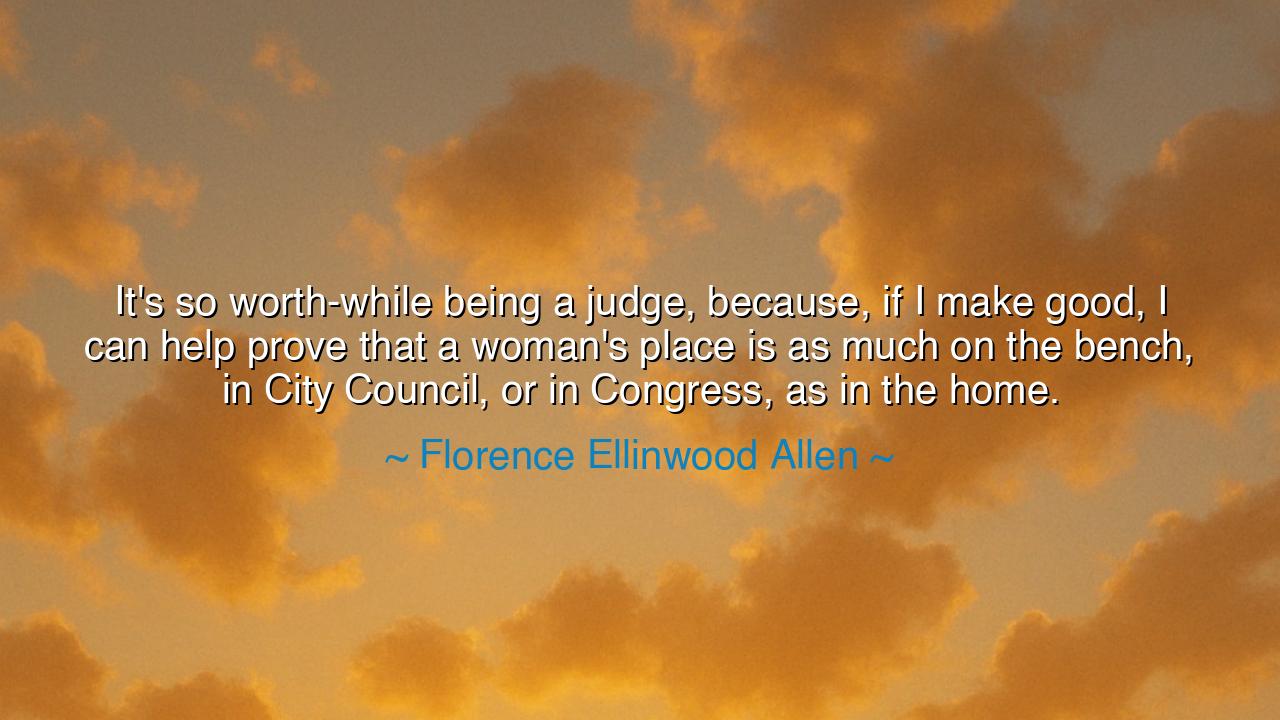
It's so worth-while being a judge, because, if I make good, I can
It's so worth-while being a judge, because, if I make good, I can help prove that a woman's place is as much on the bench, in City Council, or in Congress, as in the home.






In the words of Florence Ellinwood Allen, “It’s so worth-while being a judge, because, if I make good, I can help prove that a woman’s place is as much on the bench, in City Council, or in Congress, as in the home.” — there echoes the voice of a pioneer, filled with both resolve and grace. These are not the boastful words of one seeking power for herself, but the solemn vow of a soul carrying the hopes of countless others. In her era, when the corridors of authority were closed to women, every success of hers was not personal triumph, but vindication — proof that a woman’s mind could weigh justice as evenly as any man’s hand could hold a gavel. Beneath her calm conviction burns the fire of purpose, the sacred belief that progress is born not from rebellion alone, but from excellence achieved in the face of doubt.
The meaning of her words lies in the recognition that representation is not privilege, but responsibility. Florence Allen knew that to step into a role denied to women for centuries was to stand not as one, but as many. Her every decision, every judgment, every moment on the bench became a testament to the truth that ability knows no gender. In her statement, she reveals a truth as ancient as justice itself — that the measure of worth lies not in tradition, but in talent, not in birth, but in character and competence. She understood that if she excelled, she would not only rise, but she would lift others, proving that the mind of woman could guide law, lead cities, and shape nations.
The origin of this conviction can be traced to her life and her time. Born in 1884, Florence Ellinwood Allen grew up in an age where women’s voices were often silenced in public affairs, their intellect confined to the private sphere. Yet, she refused to accept the narrow definitions of her century. She studied law when few women dared to, and when doors remained shut, she broke them open with the quiet power of perseverance. She became the first woman to serve on a state supreme court, and later, the first to sit on a United States Court of Appeals. Her achievements were not accidents of circumstance, but deliberate victories of will and wisdom. Her life was the living embodiment of her own words: that a woman’s place is wherever truth, justice, and courage call her to be.
In the long chronicle of human history, Florence Allen stands among those who bore the weight of change without bitterness. She did not rage against the world’s injustices with despair; she answered them with mastery. This spirit recalls the example of Hypatia of Alexandria, the philosopher and mathematician of the ancient world, who taught in the face of persecution. Both women shared a sacred courage — the understanding that to challenge the ignorance of society, one must not only speak but shine. They knew that progress is not declared; it is demonstrated. The path to equality, then, is not only paved by protest, but by proof — the steady, undeniable excellence that silences every argument against justice.
In her quote, Florence Allen also reveals a profound humility. She does not say, “I will prove,” but rather, “If I make good, I can help prove.” There is in her voice an awareness that change is not the work of one, but of many — that every victory is but a stepping stone for those who will follow. Her humility itself is a form of strength, the mark of a true servant of justice. For she understood what the ancients taught: that to serve others through one’s gifts is the highest calling, and that greatness is not found in domination, but in dedication.
Her vision — that women belong not only “in the home” but also “on the bench, in City Council, or in Congress” — speaks to a universal truth: that the soul of womanhood contains multitudes. The hearth and the hall, the home and the forum, all are sanctified by her presence when she acts in wisdom. Society once confined women to one sphere, believing them unfit for another; yet Florence Allen’s life proved that justice, compassion, and intellect are not bound by gender. Like Athena, goddess of wisdom and law, she carried the balance of reason in one hand and the fire of conviction in the other — showing that leadership is not the domain of men, but of all who are just.
Thus, the lesson of her words is clear and enduring: your excellence is your argument. If the world denies your place, earn it through mastery. If it questions your worth, answer not with anger, but with achievement. For every person who breaks a barrier widens the road for countless others. Like Florence Allen, let your work be the proof of your equality, your strength the quiet revolution that transforms prejudice into progress.
And so, my children, remember this: to “make good” is not only to succeed — it is to serve. Whatever your station, let your purpose be greater than yourself. Build your home with love, but also build your world with courage. Walk into every chamber, every council, every field once closed to you, not in defiance, but in quiet certainty that you belong there. For as Florence Ellinwood Allen teaches us, when a woman — or any soul — rises with dignity and mastery, the world itself is lifted toward justice.






AAdministratorAdministrator
Welcome, honored guests. Please leave a comment, we will respond soon